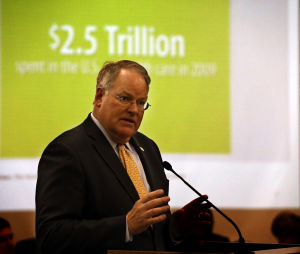
February 7, 2013
The Virginia Senate is having second thoughts about waiting another year to decide whether to expand the state’s Medicaid program to hundreds of thousands of uninsured Virginians under the national Affordable Care Act.
The Senate Finance Committee is expected to introduce an amendment to the state budget today that would allow expansion of Medicaid this year if the state succeeds in getting federal approval of changes to the program.
Committee Chairman Walter A. Stosch, R-Henrico, said Wednesday that the committee is preparing language for the budget that would change a previous provision requiring General Assembly approval next year for the program to expand.
Sen. Emmett W. Hanger Jr., R-Augusta, chairman of the finance subcommittee on health and human resources, called for the change after a presentation Wednesday by the McDonnell administration on progress in making program reforms.
“The positives (of expansion) are beginning to significantly outweigh the potential concerns and negatives in my mind,” said Hanger, who called Medicaid expansion “the most important decision on our table in this session.”
Gov. Bob McDonnell continues to resist the option of expanding Medicaid to 250,000 to 400,000 uninsured Virginians, but his administration helped make the case on Wednesday for not delaying the decision for another year.
“If you delay, it puts us further behind,” said Secretary of Health and Human Resources Bill Hazel, who said he doubted the state would be ready to expand the program on Jan. 1 even if the assembly made the decision now.
The stakes are high for Virginia, which stands to receive more than $23 billion in federal spending on the expanded program over the next nine years at a net cost to the state of $137.5 million, not including savings from pending reforms.
Regardless of the decision, Virginians will pay an estimated $26.3 billion in federal taxes through 2022 to carry out the law, whether here or in states such as Ohio and Arizona, where Republican governors have announced plans to back Medicaid expansion.
Lt. Gov. Bill Bolling cited both the economic benefits and the loss of Virginia tax dollars to other states in breaking with McDonnell last month to endorse Medicaid expansion if the state is able to reform the program.
Delaying expansion after Jan. 1 would cost Virginia an estimated $5 million a day in federal spending and $400,000 a day in state-budget savings, argued a coalition of health care advocates at news conference Wednesday.
“The bottom line is delaying Medicaid expansion becomes financially irresponsible for Virginia,” said Michael J. Cassidy, president/CEO of the Commonwealth Institute for Fiscal Analysis, which made the estimates.
McDonnell and Republican legislators remain concerned, however, that the cost to Virginia would be much higher if the federal government, under pressure to reduce the budget deficit, scales back its financial commitment to the state. The Affordable Care Act commits the federal government to 100 percent of the cost in 2014 through 2016, and no less than 90 percent thereafter.
Sen. Ryan T. McDougle, R-Hanover, pointed out that the cost to Virginia would rise by more than $1 billion a year if the state had to pay half, as it does for most Medicaid expenses now.
Hazel said the state could follow the examples set by Ohio and Arizona by specifying that if federal support fell below 85 percent of the cost, the states could begin dropping people from Medicaid coverage.
Stosch suggested the state could require a similar trigger for reforms, scaling back the program if expected cost savings and efficiencies aren’t realized. He also said Virginia could set up a “rainy day fund” to bank savings in the first five years to cover higher anticipated costs after 2018.
The most difficult question for legislators may be in defining the changes they expect in Virginia’s Medicaid program.
“What is meaningful reform and how much risk are you willing to take?” Hazel asked. “I know that we are not looking for a lot of risk for the commonwealth.”
The answer is clearer in the Senate than in the House of Delegates, where the Appropriations Committee set out a much broader process for changing the entire program before the legislature would consider expansion.
The Senate set out more specific reforms sought by the administration, which reported progress in getting federal support for the changes.
For example, Hazel said the state and federal governments are working on a cost-sharing agreement on a pilot program for people who received both Medicaid and Medicare benefits that could save Virginia more than $22 million next year and $260 million by 2022.
The Department of Health and Human Services also has issued guidance recently that would give states flexibility to fashion benefit packages for new Medicaid recipients that more closely resemble commercial insurance benefits and provide the ability to require participants to pay a share of the cost of care.
The Centers for Medicare & Medicaid Services also has shown interest in Virginia’s request to consolidate administration of its six waiver programs for special populations into one.
Hazel cautioned that working out the details of these reforms with the federal Medicaid agency could take months.
“I can’t tell you how long it will take us to get there. They’re interested. They’re talking.”
Hazel said McDonnell wants firm federal commitments for all of the changes necessary to control the delivery and cost of care for current Medicaid recipients as well as those who would become eligible under expansion.
“He is very, very skeptical we will get them to his satisfaction,” Hazel said.



